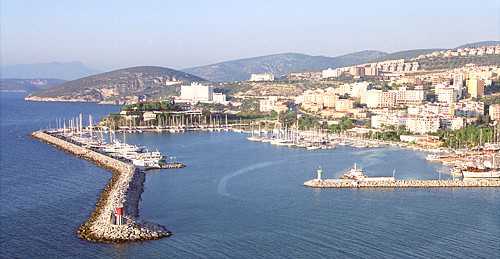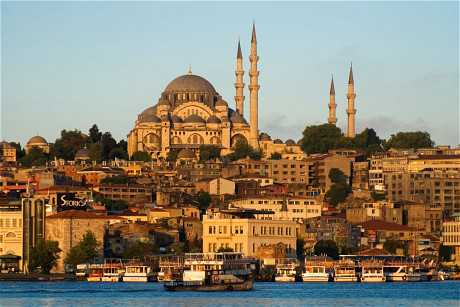A democratic Turkey that has respect in Muslim capitals is exactly what the West needs.
Published Dec 6, 2008
From the magazine issue dated Dec 15, 2008
For years Ankara’s foreign policy was fixated on a few narrow topics—how to handle the Greeks, the Kurds and Armenians—and Turkish policymakers seemed unable to solve even these chronic problems, let alone the problems of others. But these days Turkey has tackled such regional concerns with a new gusto—making the first real headway on the Cyprus issue in decades, for instance—while playing a far larger role in global affairs. In May Turkish Prime Minister Recep Tayyip Erdogan’s government mediated indirect peace talks between Syrian and Israeli officials in Istanbul. The talks are now ongoing, and further meetings have reportedly been scheduled. Erdogan also recently stepped forward to offer help to U.S. President-elect Barack Obama to deal with Iran, which Turkey’s prime minister and many others expect to be Obama’s biggest foreign-policy challenge. On November 11 Erdogan told The New York Times his government was willing to be the mediator between the new U.S. administration and Tehran. “We are the only capital that is trusted by both sides,” he reiterated later in Washington. “We are the ideal negotiator.”
This surge of interest in becoming something of a global peacemaker is in part the result of the ongoing process of Turkish democratization. The nation’s old elite consisted of the more isolationist Kemalists, the dedicated followers of Mustafa Kemal Atatürk, who established a republic without democracy in 1923 to westernize and secularize the nation. For many decades to come, society remained divided between the dominant Kemalist center and the more traditional periphery it kept under its thumb. But things fundamentally changed after the election victories of Erdogan’s Justice and Development Party (AKP) in 2002 and 2007. The “other Turkey” was now out of the periphery and into power, and while it proved to be more religious than the old elite, it also proved to be more pro-Western, and more committed to the European Union accession bid than its growingly xenophobic secular rivals.
This was not simply a convenient tactic, as some have argued. Turkey’s conservative Muslims had been undergoing a silent reformation since the 1980s, as evidenced by the country’s growing “Islamic bourgeoisie,” which sees its future in global markets, not Sharia courts. Ideas about the compatibility of Islam and liberal democracy flourished, as recently evidenced by headscarved women rallying in the streets for civil liberties for all.
Meanwhile, Ahmet Davutoglu, an erudite scholar who became Erdogan’s chief adviser, outlined a new foreign-policy vision. Turkey had unwisely denied its cultural links with the Middle East for decades, he argued, but the time had come to turn Turkey into a “soft power” that exports peace, stability and growth in its region. Hence came the rapprochement in recent years and months with Greece, Lebanon, Iraq, Iraqi Kurdistan and most recently Armenia, where President Abdullah Gül paid an ice-breaking visit in September.
Kemalist Turks dislike this “neo-Ottoman” approach, which prescribes closer relations with other Muslim nations. When Erdogan greets his Arab counterparts “in the name of God,” they are horrified and argue that the country’s secular principles are under threat. And to garner support from Westerners who are concerned about political Islam, for good reasons, they try to depict the AKP as Taliban in sheep’s clothing. But, in fact, a democratic Turkey that has respect in Muslim capitals, that can speak their language and that is willing to use this leverage for peace and reconciliation is exactly what the West needs.
Some in the West fear this approach as well, taking notice of AKP’s interests in Islam and the rampant anti-Americanism in Turkey, and sometimes conflating and confusing the two. Yet that anti-American wave is a reaction to the Iraq War and its aftermath. By empowering the Kurds in the north, the post-Saddam era unleashed the deepest of all Turkish fears: the emergence of a Greater Kurdistan. In other words, anti-Americanism is almost a derivative of anti-Kurdism, and, not too surprisingly, is strongest in the nationalist circles, which include the Kemalists. These groups, represented by the two main opposition parties, deride the AKP as American puppets and Kurdish collaborators. A 2007 bestselling book, whose Kemalist author was covertly financed by the military intelligence, even argues that both Erdogan and former AKP member President Gül are actually covert Jews who serve “the elders of Zion” by undermining Atatürk’s republic.
Turkey’s new elites are not covert Jews as some fringe Kemalists fantasize, of course. But neither are they creeping Islamists as smarter Kemalists portray. In fact they are Muslim democrats, who can both take Turkey closer to becoming a true capitalist democracy and inspire other Muslim nations to follow a similar route. For sure, they need to combat ugly nationalism inside their borders and take continued steps toward deepening liberal reforms. With such a combination of sound domestic leadership and visionary foreign policy, they would be ideal partners for the Obama administration in its own effort to reach out to the troublesome actors in the Middle East.
Akyol is a columnist for Istanbul-based Hürriyet Daily News & Economic Review.
© 2008
Source: Newsweek, 6 December 2008





